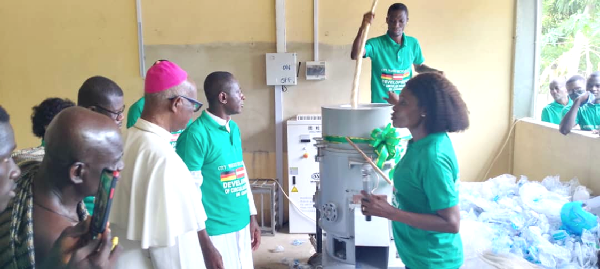
Dealing with plastic waste: Cape Coast gets recycling plant
You find them all over - plastics. At the corners and on streets, in gutters and sometimes on trees.
Advertisement
The rush for plastic use since the late 90s by particularly water bottling and sachet companies looked like a step towards modernisation and development.
Malls and shops also moved from paper bags to the "ish" of the day, plastics for packaging. Mothers moved from using baskets for shopping to the more "convenient" plastic bags.
But years down the line, the unpreparedness to manage its use and reuse has made plastics a worrying phenomenon in our communities.
Plastics at every corner and their environmental impact have been overwhelming for the country. Indeed, the story of inadequate waste recycling and management in Cape Coast and its environs is no different.
The generation of plastic waste in the Cape Coast Metropolis has shot up due to the many basic, junior, senior high and tertiary institutions in the metropolis.
While some effort is made to efficiently manage the waste, many plastics end up in the sea ultimately, affecting one of the critical economic livelihood support sectors, the fisheries industry.
The Cape Coast Metropolitan Assembly (CCMA) like many local authorities has not been able to adequately deal with the menace.
Punishment
To deal with the plastic waste challenge, the Environmental Officer at the Cape Coast Metropolitan Assembly, Iddris Shani, said the assembly was working on stiffer punishment for offenders.
He said the plastics menace was of great concern to the Cape Coast Municipal Assembly and that it resulted in environmental pollution which often led to flooding
Mr Shani said the coastal communities and fishermen had their nets catching lots of plastics instead of fish most of the time.
This, he indicated, had worrying effects on their livelihoods.
He explained that the plastics that found their way into the water bodies released micro plastics into the water, thus affecting aquatic life.
 Volunteers clearing the environment of plastic waste
Volunteers clearing the environment of plastic waste
Financial muscle
Mr Shani said the assembly did not have the financial muscle to set up a recycling plant, which was one of the ways to deal with the menace.
He said although the assembly was supposed to manage all forms of waste, it was not yet equipped to sort out waste into the various categories for recycling.
"For now, we manage all waste as one, dispose it of at a landfill site. No recycling," he stated.
Recycling waste prevents the increase of pollution by reducing the need for new, raw materials, leading to the conservation of nature and other valuable resources for the country.
Not recycling waste leads to increased pollution of the environment, destruction of natural habitats and damage to wildlife among others.
Albeit, there is a solution that would probably change the plastic waste management narrative in Cape Coast.
Advertisement
Recycling plant
A waste to resource collection and preprocessing plant has been inaugurated in Cape Coast to help deal with the plastic waste menace.
The facility's impact on the environment its environs could be phenomenal and essential.
The facility located at OLA Kojokrom was undertaken by Caritas, the charity wing of the Catholic Archdiocese of Cape Coast, with support from City Waste Recycling Limited, the German Development Cooperation and an Austrian group.
Selected primary, junior high and senior high school students, including St Augustine’s College, Holy Child School, Ghana National College and University Practice School joined the ceremony.
Advertisement
The ceremony was also used to award schools that had earlier participated in a sanitation painting competition.
 Dignitaries pledged to support efforts to ensure the plant's operations were sustained
Dignitaries pledged to support efforts to ensure the plant's operations were sustained
The Director of the Central Regional
Caritas Secretariat, Rev. Fr Stephen AmoahGyasi, said the facility was critical in the fight to redeem the environment from the plastics engulfing it.
The facility to be managed by Caritas would take plastic waste from the schools and institutions for recycling.
Advertisement
Clean Ghana
Explaining what informed construction of the recycling plant, Rev. Fr Amoah-Gyasi said: “We needed to make an intentional effort to make Ghana clean and to move away from the talk shops.”
He said the plant was committed to picking the waste and appealed to all institutions and collaborators to work to separate the waste to make the work easier.
He advised the young people to be ambassadors of proper waste disposal habits and plastic recycling to improve the environmental situation, especially in and around Cape Coast.
The Managing Director of City Waste Recycling Limited, Vivian Ahiayibor, for her part stated that it was time the nation's young people imbibed the right environmental attitudes if the fight against plastics was to be won.
She indicated that City Waste Recycling Limited was working with schools and communities to recycle waste, create jobs and mitigate the use of plastic through education and sensitisation.
Ms Ahiayibor said the drawing competition was also to create awareness and promote healthier environmental practices among the young people.
She said entries would be entered into a bigger pool and winners would be awarded at a ceremony in Germany.
Spiritual effort
The Archbishop Emeritus of Cape Coast, Most Rev. Mathias Kobena Nketsiah, said humans were charged by God to nurture the environment but they had not done well with that charge, polluting the environment and destroying nature.
He said the recycling plant was not just a physical plant but a spiritual effort that would help keep the environment cleaner and healthier.
Rev. Fr Amoah Gyasi called on institutions to support the plant to rid the metropolis of plastic waste, by gathering and supplying plastic waste to the recycling plant
"It’s to save our environment and make it better and healthier for us all and we must pledge to make it work by supplying your waste plastics to the plant," he added.




